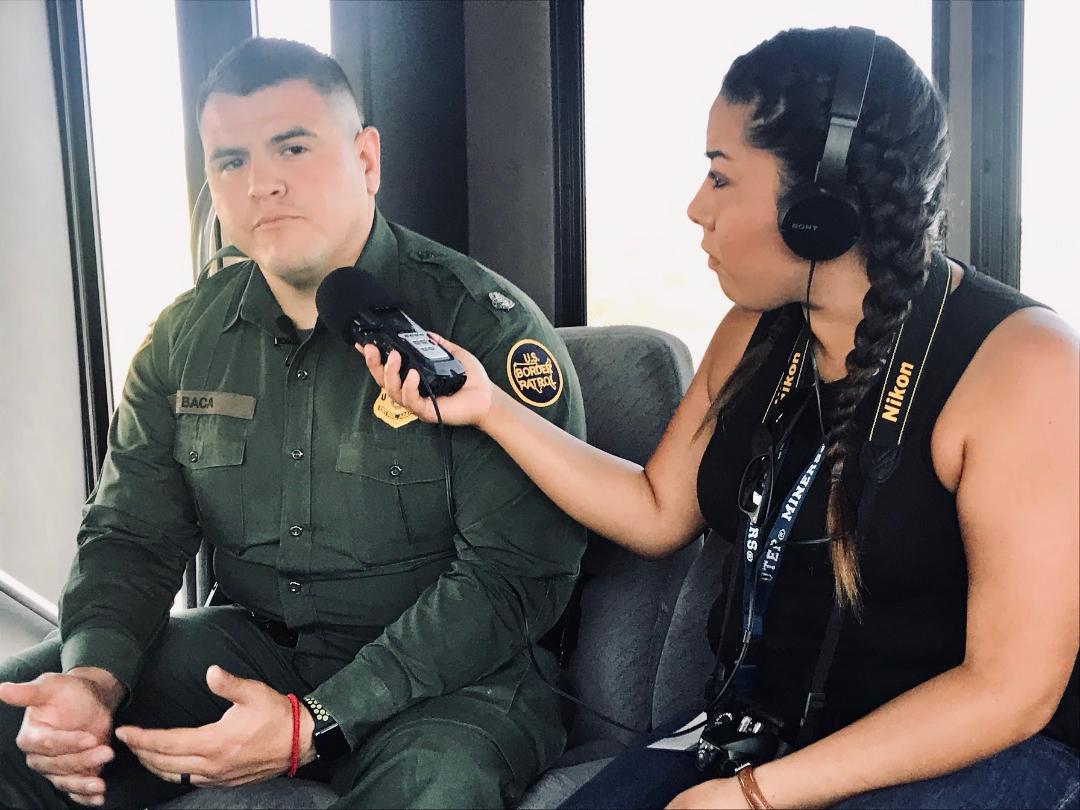- Jon Mark Beilue
- Education
Summer and a Full Suitcase
The border, China and Cuba have Garcia globetrotting
From reporting on the border of the United States and Mexico, to teaching a five-week class in Beijing, to preparing to leave for Cuba to advance a study abroad trip, the summer for Dr. Nancy Garcia was, to say the least, an international whirlwind.
"It was pretty eventful," she said. "It’s been a lot of airports and a lot of traveling. I was getting out of my comfort zone, but I was also getting to work with young people."
Garcia, the faculty advisor for The Prairie, West Texas A&M University’s student newspaper and online website, is an assistant professor of media communications. And it’s her position with WT that propelled her to three unlikely stops this summer.
For seven days in late May and early June, Garcia was in El Paso reporting on border security for Borderzine through a grant provided by the Dow Jones News Fund. She then left June 21 for Beijing, teaching speech communication for five weeks to Chinese students in an international program through Seminole State in Sanford, Fla.
Garcia returned to Amarillo on July 27 just long enough to do some laundry with some other errands before leaving on Aug. 4 for Havana to plan a trip for a likely study abroad for WT multi-media students that could begin in 2021.
"I learned so much," Garcia said, "and it’s good to be challenged and stretched like that."
Garcia was among 12 college professors involved in the Dow Jones’ multi-media academy. The training program is for those who teach in institutions with a large minority program.
Garcia, who immigrated from Mexico in 2004 when she was 14, was part of a ride-along with the U.S. Border Patrol as she helped profile border agents. It was two days of workshops, and the rest of the time it was in the field with agents along the border near El Paso.
"It was not political at all," Garcia said. "The goal was for people to understand the situation and truly what is happening. Some of these stories are about the human side of the Border Patrol. It’s a hard situation. I can go back and forth on why people try to get here for a better life."
What Border Patrol agents told Garcia is not only the agency underfunded and understaffed, but with an increased number of detainees, they are having to take on additional duties.
"A lot of money they say could be used for more agents is being saved for a wall," Garcia said. "Yes, they do support the president and what needs to be done to protect the border, but at the same time, they see they need more people. It’s a tough position for them."
Garcia said the public often hears just one side of the border story. While acknowledging it’s possible agents may have been putting their best foot forward because of the camera, she saw them interacting extensively with many Mexican detainees.
"They are providing for many of their daily needs, which is not really the job they signed up for," Garcia said. "We were able to see how they treated people, and they were very kind to kids. One of them told me he carries diapers with him all the time. It’s not just about the immigrants, but about the Border Patrol too. I don’t think that story has been told as well about how much their job has changed."

A different way to teach in China
Two weeks after leaving El Paso, Garcia was flying to China. It was her second year to teach oral communication and introduction to speech communication at Capital University of Economics and Business. It’s an English-speaking university, where the students have been studying in the U.S., Canada and Great Britain.
"It’s very challenging because Chinese students come from a completely different educational system," Garcia said.
They aren’t use to group discussion or talking in front of a class, which is problematic if that course is speech. They prefer a presentation of the material, a test and then move on.
"Not a lot of engagement or conversation," she said. "I ask questions and they just look at me, which happens in the U.S. too."
A year ago, in her first year in China, Garcia thought she was doing something wrong until a student explained they weren’t used to that. So she had to adapt — more homework, more specific questions on tests.
And that image of Chinese students all being brilliant and overachievers? Not exactly true.
"Just like anything, a lot of stereotypes and misconception," Garcia said. "I failed students and had students not show for class. But I also had students who did everything I told them to do. In the classroom, as far as being super smart and giving everything they got, it’s really a stereotype."
Not quite done with the summer, Garcia is heading to Havana the first week of August. Last year, she applied for a grant to take students to study in Cuba.
Garcia, as part of the grant, will be previewing the International Journalism Institute, and making contact with journalists who can provide discussion with WT students on freedom of the press and other issues. They also will perform a service project, and Garcia will see what options there are.
"It’s just to make sure everything is in place and will work out once we get final approval," she said.
To think just 15 years ago, Garcia and family came from Mexico to Booker, Texas, in the far northeast Panhandle, where her father was a migrant worker. She was 14 and only knew the very basics of the English language.
An obvious quick study, Garcia graduated from Booker, and received scholarship help to WT through College Assistance Migrant Program (CAMP). After graduation from WT, she got her master’s and doctorate degrees at Texas Tech University.
"I really didn’t know if I was going to go to college," said Garcia, in her third year as an assistant professor of media communications. "First generation student, oldest of four. I didn’t know if it was something I could do. But I got this scholarship and it was, 'OK, maybe try it a year and see how it works out."
By any measurement, including frequent flyer miles, it has.
Do you know of a student, faculty member, project, an alumnus or any other story idea for "WT: The Heart and Soul of the Texas Panhandle?" If so, email Jon Mark Beilue at jbeilue@wtamu.edu.
—WTAMU—

